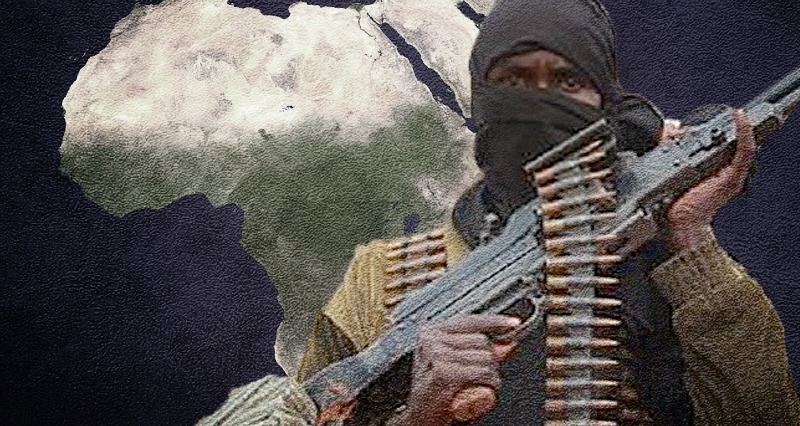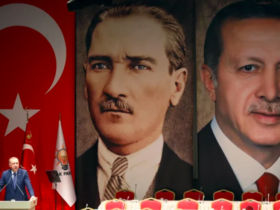Since the early 2000s, international terrorism has been the number one threat to global security. Radical groups operate throughout the vast expanse of the Islamic world: from Morocco to Indonesia. Residents of countries where Muslims do not make up the majority of the population have also become victims of the attacks, such as during the 9/11 attacks in the United States, the terrorist attacks in France and Belgium in 2015-2016, or recent attacks in Sri Lanka.
Terror goes south
As it stands today, the main terrorist organizations, such as the Islamic State (ISIS) and al-Qaeda, have been more or less defeated in the Middle East. ISIS has virtually ceased to exist in Syria, Iraq and Libya. Despite attempts to increase their influence in Yemen and Afghanistan, these terrorist groups are far less influential and significant than the military and political players involved.
However, a completely different situation is developing in the sub-Saharan Africa where these terrorist groups are still very active. The epicenter of terrorist activity in East Africa is Somalia, where the Harakat al-Shabab al- Mujahidin movement is extending its activities into Kenya. In West Africa, the most infamous group is Nigeria’s”Boko Haram ” (also known as The Islamic State in West Africa or Islamic State’s West Africa Province – ISWAP ). Its activities extend into Niger, Chad and Cameroon.
Both movements are powerful, and regularly demonstrate that African states, even with the support of Western countries, can do nothing to stop them. Both groups organize attacks virtually on a daily basis. Al-Qaeda in the Islamic Maghreb ( AQIM ) is also still active in the Sahel region.
Moreover there is evidence that the terrorists are expanding their activities in the Central and Southern parts of the continent.
On April 1, ISIS announced its first terrorist attack in the Democratic Republic of the Congo and declared the creation of Wilayat Central Africa. On August 1, the United States States’ Counterterrorism Coordinator Ambassador Nathan Sales recognized that insurgents in the Democratic Republic of Congo and Mozambique are now “publicly aligning themselves with ISIS.”
On September 26, international terrorism expert Jasmine Opperman, in interview to South African news site Citizen, said that, as a result of rising terrorist activity in Mozambique’s Cabo Delgado province, “terror is on the SA doorstep.” IS also claimed two attacks in Mozambique in its al- Naba magazine last week.
“Help” from the West
The authorities of most African countries are increasingly reliant on Western countries, primarily France and the United States, in the fight against terror. Since 2014, France has been conducting anti-insurgent operation “Barkhane ” in Mauritania, Mali, Burkina Faso, Niger and Chad.
As of 2018, it has been supported by the UK . The total number of French troops deployed as a part of this counter-terrorism initiative is around 3,000. However, none of their actions have led to a significant reduction in terrorist activity.
The same can be said about the actions of the United States. In 2008, the United States created the United States Africa Command, USAFRICOM, whose main role is ensuring American military presence of Special Operations Forces. According to the official website of the US Special Operations Command, forces subordinate to it are now present in about half of the 54 African countries. Drone attacks and support from American “advisers” is also prevelent.
US intervention has also been unsuccessful in curbing the spread of terrorism. Last year, former National Security Adviser John Bolton acknowledged that there was a “proliferation of Radical Islamic Terrorism, and other forms of violent conflict, across Africa” and that “billions upon billions of US taxpayer dollars… have not stopped the scourge of terrorism, radicalism, and violence.”
One possible reason is the negative perception that US military presence brings with it. The emergence and prevalence of the US military in any African country only seems to fuel Islamic extremism. This is in part because the US attempts to promote its own liberal ideology as an imminent component of their support to the countries and regimes they are “assisting,” which is perceived as a form of cultural imperialism.
“US attempts to support democratization and aid fragile democracies have at times contributed to further upheaval and abetted extremist groups,” notes the founder of World Politics Review Hampton Stephens.
At the same time, accusations against the United States and its allies that they themselves secretly support terrorist groups have become more and more frequent. In 2015, then Sudanese President Omar Bashir declared that the US and Israel were the ones behind Boko Haram and ISIS in Africa. The Nigeria army has repeatedly accused NGOs associated with Western countries of supporting terrorists. On September 20, the Nigerian Army declared that the French NGO Action Against Hunger (ACF) was providing support to terrorists.
In addition, Western countries are often attempting to solve the problems they themselves created in Africa. The overthrow of the Gaddafi regime in Libya by NATO countries with the active participation of France led to the appearance of ISIS terrorists on Libyan soil. Another consequence of the overthrow of Gaddafi and the civil war in Libya was the Tuareg uprising in Mali in 2011-2012, which quickly took an extremist Islamic form. The eventual result was France’s military intervention in Mali.
Reason for the presence of Western powers
The presence of French, American and British troops and military advisers in Africa is not solving the continent’s problem of terrorism. As a matter of fact, the United States is not really even interested in solving the problem in the first place.
It is worth recalling that, since 2001, American military operations abroad have been justified by by the ‘fight against terrorism.’ Until now, US troops, from a legal point of view, can conduct military operations outside the country in accordance with The Authorization for Use of Military Force (AUMF) issued by the Congress in 2001. This act authorizes the use of United States Armed Forces against those responsible for the attacks on September 11, 2001 along with any “associated forces.”
Because of the wording of this ruling, the defeat of terrorism in Africa, from at least a legal point of view, would raise the question of reducing or eliminating the US military presence in this region, which Washington definitly does not want.
Last year, White House national security adviser John Bolton announced the Trump administration’s Africa strategy. He declared that Chinese and Russian influence in the region is a national security threat for the US and hinted at the need to strengthen American presence. Bolton indicated that the US “will also take several additional steps to help our African friends fight terrorism and strengthen the rule of law.”
Representatives of the Democratic Party demand even greater US involvement in the affairs of African countries under the guise of combating terrorism.
On September 17, the Washington Post published an article by two former representatives of the Obama administration which attempted to push things further in this direction. In the article, Grant T. Harris, who was senior director for Africa at the White House from 2011 to 2015 and former Michael McFaul American ambassador to Russia, complain that Russia has outplayed the US in the region. At the same time, they criticize Trump for the withdrawal of troops from the region and lack of interest in the continent.
This is an absolutely false and manipulative argument. Trump’s African strategy, announced earlier by Bolton, directly speaks about the need to strengthen US positions. Nathan Sales also signaled that the US wants to shift its counter-terrorist actions in order to focus more on Africa.
However, the article by Obama’s associates is a sign that if the current Republican administration in the White House is replaced by a Democratic one, Washington will try to maintain and even bolster its military presence in Africa under the guise of fighting terrorism.
Non – western alternatives
What alternatives do African countries have in the fight against terrorism, given that the West has proven at best ineffective, and moreso guided by their neocolonialist intentions?
- Africa for Africans . First of all, African states need to rely on each other and themselves. There are existing formats that could be strengthened in this regard, for example, the African Union Mission in Somalia. New formations could also be created. The G5 Sahel states – Chad, Burkina Faso, Mali, Mauritania and Niger, for example, are constantly calling for direct UN funding of antiterrorist G5 Sahel Joint Force, but the initiative is opposed by the US.
- Promotion of traditional Islam. The experience of the Russian military campaign in Chechnya shows that the leaders of Sufi Islam, even those who are aggressive towards the West and the modern world, can become allies in the fight against Wahhabism and terrorism. However, such an alliance cannot be successful under the precondition of a sociocultural orientation toward Western countries and Western liberal values.
- Turning to non-Western countries experienced in the fight against terrorism. The experience of Chechnya and the successful military operation in Syria led by Russia, earlier mentioned is a great example. The experience of the Shanghai Cooperation Organization, with the active participation of China, is another. The high-tech control mechanisms that China uses in Xinjiang have also proven successful.
- The development of military-technical and expert cooperation with Russia and China. The experience of the Central African Republic demonstrates that this country, which had suffered from years of civil war between Muslim and Christian militias, shows that is possible to achieve substantial stabilization, which took place after Russian military advisers began working there. It is Russia and China that can provide African countries with cheap and modern weapons, including drones (Chinese drones are no worse and even better than the American and European ones).
- Another potential solution is rapprochement with Turkey. Under President Erdogan, Ankara has shown increased attention to Africa. Unlike Russia, China or Western countries, it is a Muslim majority country, and, unlike the Persian Gulf countries, Turkey promotes a moderate version of Islam and has proven itself to be a defender of Muslim interests on the world stage. In Syria, Turkey has demonstrated that it can facilitate de-escalation, working closely with Russia and Iran. The positive experience of Turkish-Russian cooperation in Syria can likely be replicated in other parts of the world.
With the help of Turkey, it is possible to initiate work toward de-radicalization with Muslim communities. Military-technical cooperation with Turkey will cause fewer objections from local Muslims than cooperation with non-Muslim countries does. In addition, Turkey has a developed military-industrial complex and can offer African countries modern weapons (such as drones and missiles) at low prices.
To fight terrorism effectively, African countries must achieve strategic autonomy from Western powers, which, under the guise of fighting terrorism, seek to put Africa within their spheres of influence. There is a way out for Africa: regional cooperation combined with the international cooperation of non-Western countries which have experience in the fight against terrorism.

















Leave a Reply